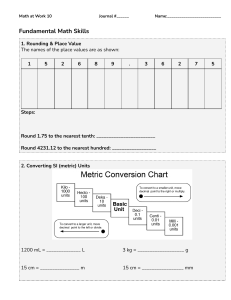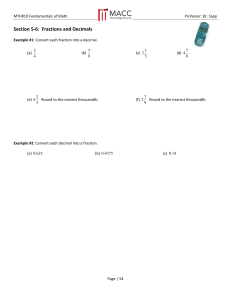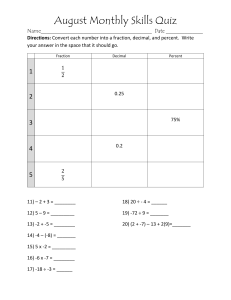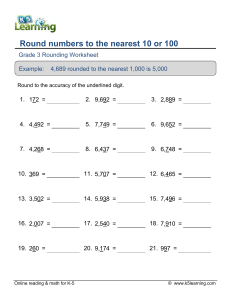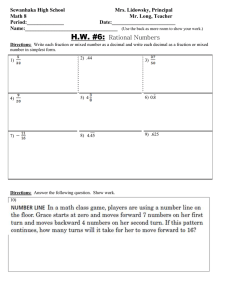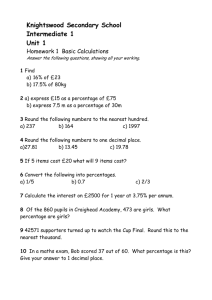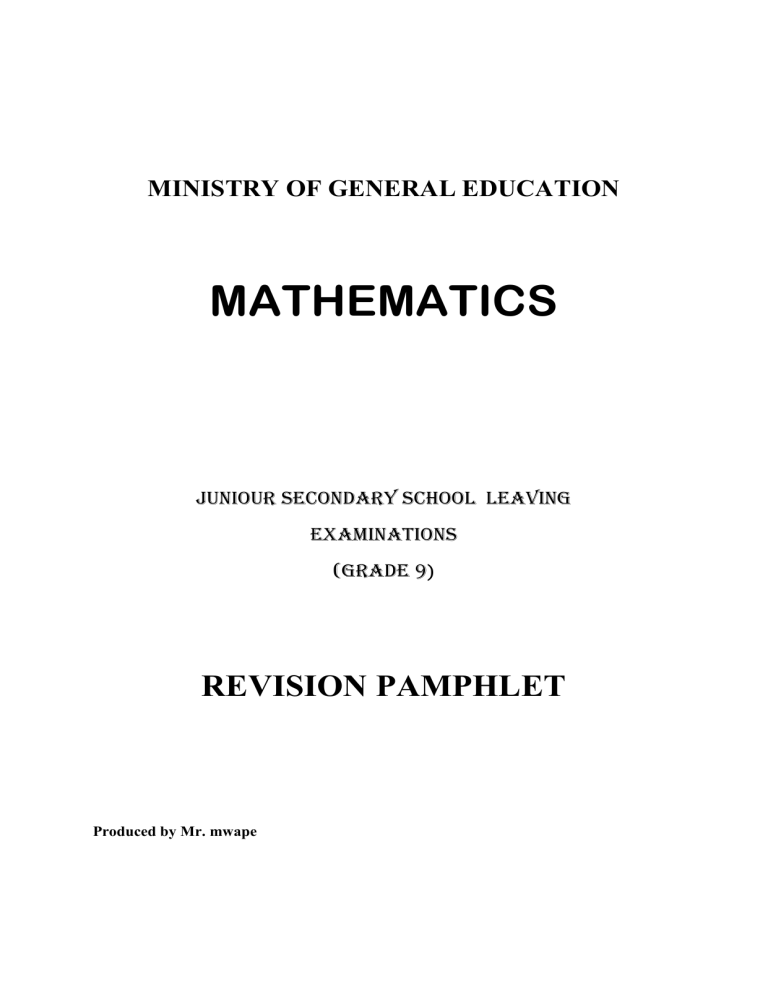
MINISTRY OF GENERAL EDUCATION MATHEMATICS JUNIOUR SECONDARY SCHOOL LEAVING EXAMINATIONS (GRADE 9) REVISION PAMPHLET Produced by Mr. mwape 1. Percentages A percentage is a fraction which has 100 as a denominator. It is always calculated out of 100. For example, 507 can be expressed as a percentage by multiplying it by 100: 507 100 14% . We can also express 45% as a fraction by dividing it by 100: 45% 45 100 1.5.1 To change a percentage to a fraction and to a Decimal (i) Write as a fraction with a denominator of 100. (ii) First change it to a fraction and then to a decimal. Examples Write these percentages as: (i) decimals (ii) fractions (a) 35% (b) 225% (c) 17½% Solutions 35 35 7 0 35 (ii) 35% 100 100 20 225 225 9 (b)(i) 225% 2 25 (ii) 225% 100 100 4 17 5 17 5 175 7 (c)(i) 17 12 % (ii) 17 12 % 0 175 100 100 1000 40 (a)(i) 35% Exercise 1A Write the following percentages as: (a) decimals (b) fractions 1.(a) 60% (b) 85% (c) 56% (d) 2½% (e) 55⅔ 1.5.2 Changing fractions and decimals to percentages To change a decimal or a fraction to a percentage multiply by 100. Examples Write the following numbers as percentages: (a) 0.43 (b) 7 20 (c) 0.335 (d) 37 40 Solutions (a) 0 43 0 43 100 43% (c) 0 335 0 335 100 33 5% 7 7 100 35% 20 20 37 37 (d) 100 92 5% 40 40 (b) Write the following numbers as percentages: 1) ¾ 37 2) 0.9 3) 25 4) 0.075 5) 0.1875 6) 1.07 9 20 . 2. APPROXIMATIONS AND ESTIMATION 2.1 Approximations deal mainly with rounding off numbers to given decimal places, to the nearest unit and to given significant figures. 2.2 Rules for Rounding off (a) If the rounding off figure is greater than 5, increase the next figure by 1. (b) If the rounding off figure is less than 5, leave the next figure by 1. (c) If the rounding off figure is 5, (i) leave the next figure if it is even (ii) increase the next figure by 1 if it is odd. 2.3 Significant figures (a) All non-zero digits in any number are significant (b) In a whole number, (i) any zero after the last non-zero digit is not significant (ii) any zero between the first and the last non-zero digit is significant (c) In a decimal number, (i) any zero between the first and the last non-zero digit is significant (ii) any zero after the last non-zero digit is significant (iii) any zero before the first non-zero digit is not significant. 2.4 Scientific Notation A number in Scientific notation or Standard form is written as A 10 n , where n is an integer and A is also an integer such that 1 ≤ A ˂ 10. 2.5 Estimation To estimate means to find an approximate result by rounding off numbers to make the calculations easier. Examples 1. Write down 53.09752 correct to: (i) 3 decimal places (ii) 2 decimal places 2. Write down 76.008 correct to: (iii) The nearest whole number (i) 4 significant figures (ii) 1 significant figures 3. Round off 2945.31 kg to the: (i) Nearest tenth of a kg (ii) Nearest hundredth of a kg (iii) Nearest ten kg (iv) Nearest thousand kg 4. Estimate the value of 47.2 110 , giving your answer to one significant figure. 2.135 46.9 5. Express the following numbers in Standard form (i) 425871, correct to 3 significant figures (ii) 0.00279059, correct to 3 significant figures Solutions 1. (i) 53.09752 = 53.098 to 3 decimal places (ii) 53.09752 = 53.10 to 2 decimal places (iii) 53.09752 = 53 to the nearest whole number 2. (i) 76.01 (ii) 80 3. (i) 2945.4 kg (ii) 2945.37 kg 4. (iii) 2950 kg (iv) 3000 kg 47.2 110 50 100 50 2.135 46.9 2 50 5.(i) 42587 4 26 10 4 (ii) 0 00279059 2 80 10 3 Exercise 2 1. Round off 1275 correct to: (i) 1 significant figure (ii) 2 significant figures (iii) 3 significant figures 2. Write down the figure 0.0079653 correct to: (i) 1 significant figure (ii) 4 significant figures 3. Round off 8647.5832 metres to: (i) the nearest tenth of a metre (ii) the nearest hundredth of a metre (iii) the nearest ten metre (iv) the nearest thousand metre 4. A man bought a pair of short trousers at K 78.99, a vest at K 35.85 and a handkerchief at K 14.45. Estimate how much he spent? 5.(a) Express 509,970 in standard form. (b) Express 0.0005426 in standard form, correct to 2 decimal places. 6. If 0.000085=8.5×10−𝑛 , find the value of n. 7. Simplify 4.8×10ˉ3 . 8. Express 0.537 as a percentage correct to two significant figures. 9. Express the following numbers in standard form: (a) 0.0205 (b) 599900 10. Express the following numbers in standard form correct to 2 significant figures. (a) 0.000439 (b) 599900 11. The size of a certain country in square kilometers is 752614. Express this number: (i) to 1 significant figure. (ii) to the nearest 1000 km2 12. Round off 141768 to the nearest 100. 13. Write the number 2381.597 to: (i) The nearest hundred. (ii) 3 Significant figures. (iii) 2 decimal places. 14. Find an estimate of the value of each of the following. Give your answer to one significant figure: (a) 30 0 049 (b) 0 0123 5040 (c) 9 87 5 79 0 48 Answers to Exercise 2 1.(i) 1000 (ii) 1300 (iii) 1280 2.(i) 0.008 (ii) 0.007965 3.(i) 8647.6 m (ii) 8647.58 m (iii) 8650 m 5.(a) 509970 5 09970 105 6. n 5 10.(a) 7. 0.0048 4 4 10 4 (b) (b) 0 0005426 5 43 10 4 8. 54% 9.(a) 6 0 105 13.(i) 2 400 (ii) 2 380 (iii) 2 381 4. K 130 2 05 10 2 11.(i) 800 000 (b) 5 999 105 (ii) 753 000 14.(a) 600 (b) 50 (c) 7 4. ALGEBRA 4.1 Evaluation and Simplification of Algebraic Expressions Examples 1. Given that x 2 , y 3 and z 1 , evaluate 12. 141 800 (i) xyz (ii) (iii) x 2 y 3xz x2 y z (iv) xy 15z 2. Simplify each of the following (i) 4 3( x y ) 2(3x 1) 6 y 5ab 10a 2 (iii) 5a x(2 x 3) y(3x y) 2(3xy 1) 6 y 2 (ii) 4x2 y 5 y3 (iv) 2 xy2 x 1 2 x 1 as a single fraction. 4 3 3. Express Solutions 1. (i) xyz 2(3)( 1) (ii) x 2 y z 2 2 (3) (1) 12 1 6 11 (iii) x 2 y 3xz 2 2(3) 3(2)( 1) 2.(i) (iv) xy 15z 2(3) 15(1) 2 ( 6) 3(2) 615 26 6 9 14 3 4 3( x y ) 2(3x 1) 6 y (ii) x(2 x 3) y(3x y) 2(3xy 1) 6 y 2 4 3x 3 y 6 x 2 6 y 2 x 2 3x 3xy y 2 6 xy 2 6 y 2 4 2 3x 6 x 3 y 6 y 2 x 2 3x 3xy 6 xy y 2 6 y 2 2 6 3x 3 y 2 x 2 3x 3xy 5 y 2 2 5ab 10a 2 5a(b 2a) (iii) 5a 5a 4 x 2 y 5 y 3 4 x 2 1 y1 3 2 (iv) 2 xy2 2 b 2a 3. The easiest method is to use cross multiplication: x 1 2 x 1 3( x 1) 4(2 x 1) 4 3 12 3( x 1) 4(2 x 1) 12 2xy2 a c da bc . b d bd 3x 3 8 x 4 12 5x 7 . 12 4.2 Factorisation, The Difference of Two Squares Examples 1.(a) Factorise completely (i) 2 x 2 y 2 z a2 x2 a2 y 2 (b) (i) (ii) a2 x2 a2 y 2 (ii) 5 x 2 50 y 2 24 xy2 6 x 2 y 12 x 2 y 2 (iii) (iii) 12 27 a 2 Solutions 1.(a)(i) 2 x 2 y 2 z 2( x y z ) 24 xy2 6 x 2 y 12 x 2 y 2 6 xy(4 y x 2 xy) (iii) (b)(i) a2 x2 a2 y 2 a2 (x2 y 2 ) (ii) a2 x2 a2 y 2 a2 (x2 y 2 ) (ii) 5x 2 125 y 2 5( x 2 25 y 2 ) 5( x 5 y ) ( x 5 y ) a 2 ( x y) ( x y) (iii) 12 27a 2 3(4 9a 2 ) 3(2 3a) (2 3a) Exercise 4 1.(a) Given that x 2 , y 1 and z 4 , evaluate (i) x 2 y 3 z (ii) (iii) x 2 y 3xz xy3 z 2 (iv) 4y x z2 (b) Find the value of each of the following if a 6 , b 8 and c 3 (i) b 2 4ac (ii) b 3a b 2c (iii) 2abc 3ab 5ac 2. Simplify each of the following (i) 10 2(3x y ) 5( x 1) 7 y (iii) 24 pq 2 6 p 2 q 12 p (ii) a(2 3a) b(2a b) (2ab 5) b 2 (iv) 9 x 4 y 2 15 y 5 3x 2 y 2 6 2 (v) 6 x y 3. Express each of the following as a single fraction in its lowest terms. (a) 2x x 1 5 3 (b) x4 x 1 2 6 (c) 4 y y2 4 7 2 x2 y (d) 2 y 3 2x 1 5 6 (e) x2 3x 4 11 6. Factorise each of the following completely (a) ax ay a 2 z (b) xy2 x 2 y (c) 18 x 2 y 6 xy2 12 x 2 y 2 7. Factorise each of the following completely (a) 7a 2 x 2 28a 2 y 2 (b) 75 x 2 3 y 2 (c) 8m 2 2k 2 Answers to Exercise 4 1.(a)(i) 16 (ii) 6 (iii) 24 (iv) 6 2.(i) 15 11x 9 y (ii) (v) (b)(i) 8 (ii) 3a 2 2b 2 2a 4ab 13 2 (iii) (iii) 54 q ( 4q p ) 2 (iv) 45 x 2 y 5 12 x 4 y . INDICES: 5.1 Laws Of Indices (i) am x an = am+n (ii) an ÷ 𝑎𝑚 = 𝑎𝑛−𝑚 5.2 Multiplication And Division Of Powers Of The Same Base W e can express the product of two powers in index form if the two powers have the same base. Examples 1. Express the product of 52 and 54 in the index form. 52 x 54 = (5 x 5) x ( 5 x 5 x 5 x 5) =5x5x5x5x5x5 =56. 2. Simplify 32 x 36 32 x 36 = (3 x3) x ( 3 x 3 x 3 x 3 x 3 x 3) = 3 x 3 x 3 x 3 x 3 x 3 x 3 x3 = 38. Similarly when dividing powers, we can express the answer in index form if the two powers have the same base. Examples Simplify (a) 75 ÷ 72 96 (b) 94 Solutions (a) 75 ÷ 72 = 7x7x7x7x7 7x7 =7 x 7 x 7 = 73 (b) 96 94 = 9 x 9 x 9 x9 x9 x9 9x9x9x9 = 81 Exercise 1. Simplify the following (a) p4 x p2 (b) a10 ÷ 𝑎5 1. MATRICES 11.1 Definitions A matrix is a rectangular array of numbers arranged in rows and columns. The numbers contained in a matrix are called elements or entries of a matrix. These elements are enclosed in either the square brackets or round brackets. Examples of matrices are given below. 8 2 4 1 3 2 , , 3 , 9 0 6, 5 7 4 1 1 1 2 1 3 5 1 4 7 6 0 0 8 9 The order of a matrix is determined by the numbers of rows and columns of a matrix. The order is written as r c , where r is the number of rows and c the number of columns. A square matrix is an n n . This means the number of rows is equal to the number of columns. 1 0 0 0 and the matrix whose entries are all zero is The 2 2 identity matrix is 0 1 0 0 known as the zero matrix. The zero matrix can be of any order. 11.2 Multiplication of a Matrix by a Scalar If a matrix is multiplied by a number k, all the entries are multiplied by k. a b k d e c ka kb kc . f kd ke kf 11.3 Addition and Subtraction of Matrices Two or more matrices can only be added(or subtracted) if and only if they have the same order. To do this corresponding entries are added(or subtracted). a b w x p q a w p b x q . c d y z r s c y r d z s 11.3 Multiplication of a Matrix by Another Matrix A matrix of order a b can be multiplied by a matrix of order r c if and only if b r . In other words matrix multiplication is only possible if the number of columns of the first matrix is equal to the number of rows of the second matrix. a b w x aw by ax bz . c d y z cw dy cx dz If matrix A is of order a b and matrix B is of order r c and the product AB = C, then matrix C will be of order a c . 11.4 Equal Matrices If two matrices are equal, then their corresponding entries are equal. a b w x , then a w , b x , c y and d z . If c d y z Examples 1. Write down the order of each of the following matrices 2 4 (i) 5 7 1 3 2 (ii) 4 1 1 8 (iii) 3 1 (iv) 7 2 2.(a) Evaluate 4 4 2 3 (i) 3 1 2 1 2 3 (ii) 3 2 5 4 1 3 4 7 1 4 7 , B , C and D (b) Given that A 5 2 6 5 2 5 (i) A B 3. (ii) A 2B x 3 40 2x , find the value of x. Given that 8 3 4 12 2 , evaluate 3 (iii) BD 4. Find the value of x and the value of y if x 3 1 9 6 . y 0 3 Solutions 1.(i) 2 2 2.(a)(i) (ii) (ii) 2 3 (iii) 3 1 (iv) 1 2 4 2 3 4 4 3 2 4 3 1 2 1 3 2 1 1 7 6 5 0 2 3 2 6 3 2 5 3 10 4 1 4 2 2 (6) 3 10 42 4 5 2 3 7 1 4 (b)(i) A B 5 2 6 5 31 4 7 5 6 2 5 4 3 11 7 (ii) 3. 3 7 1 4 2 (ii) A 2B 5 2 6 5 3 14 2 4 5 2 12 10 3 2 4 14 5 12 2 (10) 18 1 7 8 1 2 14 3 7 BD 6 5 3 12 15 17 3 x 3 40 2x 8 3 4 12 6 x 4 x 40 24 12 12 10x 40 12 12 10 x 40 x4 x 4. 3 1 9 6 y 0 3 3x 0 3x x 3 y 9 x 3 y 9 6 6 3x 9 x 3y 6 3 3y 6 3y 9 3 3y 6 y 2 x 3. Exercise 11 1. Write down the order of each of the following matrices. (i) 9 0 6 2 1 3 5 (ii) 1 4 7 6 0 0 8 9 (iii) 9 2.(a) Evaluate 7 6 2 3 1 2 3 (i) 5 2 4 1 4 5 1 6 4 , Q (b) Given that P 3 1 3 (i) P 1 Q 2 2 4 5 (ii) 3 5 2 7 1 3 2 0 4 2 3 1 and S 6 0 , R 1 2 8 4 (ii) Q 2P (iii) PS 2 , evaluate 3 (iv) QR 2 9 2 10 and Q , find P Q . 3. If P 6 4 5 3 2 4 and N 4. If M 0 1 (i) M 2N 0 3 , find 0 4 (ii) 3N M I , where I is the identity matrix. 2 5. Find the matrix product 3 . 5 b 1 0 2a , find the value of a and the value of b. 6. Given that 4b 3 1 11 2 1 11 1 . 7. Find the value of p and the value of q if p 3 q 1 4 3 3 1 , C 6 8 4 2, evaluate , B A 2 4 2 1 8. Given that (i) 3A (ii) 4B (iii) 1 2 C 8 0 4 1 2 9. Given the matrix P 1 2 5 2 3 (i) write down the number of entries in P (ii) write down the order of P (iii) Find 3P 1 0 2 . 10. Express as a single matrix 0 1 5 11. Find the value of x and the value of y for the given matrix equations. x 0 2 2 1 0 (b) 2 y 2 2 0 5 x 2 3 8 (a) 1 y 1 0 12. Malaya Johnas bought 5 oranges and 11 bananas while his friend Nkhata Elijah bought 1 orange and 4 bananas. (a) Form two matrices to calculate how many oranges and bananas they have altogether. (b) If the cost of an orange is K5 and that of the banana is K2, form two matrices and use them to find the total cost that each one paid. Answers to Exercise 11 1.(i) .(i) 1 3 (ii) 3 4 9 8 2.(a)(i) 13 14 2 2 4.(i) 0 7 19 (ii) 2 5 3 5 (ii) 0 12 (iii) 1 1 5 3 4 (b) 0 5 5 6 5. 15 4 1 3. 11 1 6. a 1 , b 2 7. p 4 , q 1 12 9 8. .(i) 6 3 12 4 (ii) 8 16 12 3 6 9.(i) 10 (ii) 2 5 (iii) 3 6 15 2 10. 5 11.(a) x 2 , y 3 (b) x 1 , y 3 5 1 6 12.(a) , they have 6 oranges and 15 bananas. 11 4 15 5 1 5 27 , Malaya paid K 27, Nkhata paid K 63. (b) 11 4 2 63 24 6 0 9
